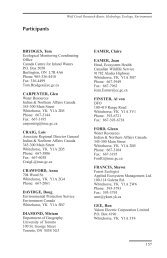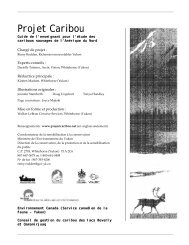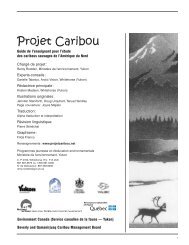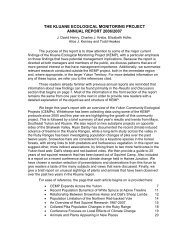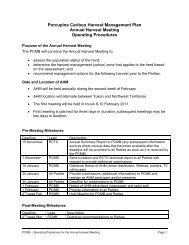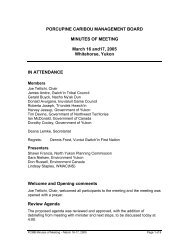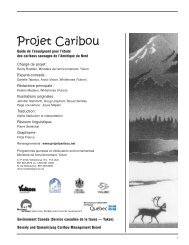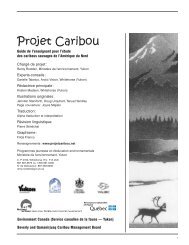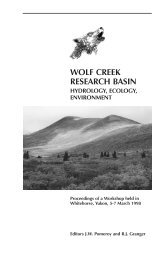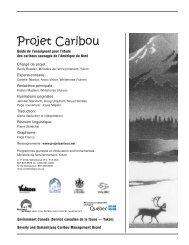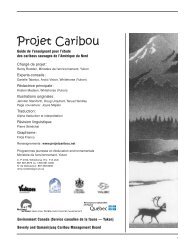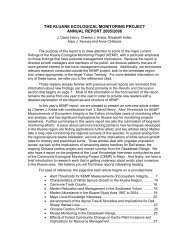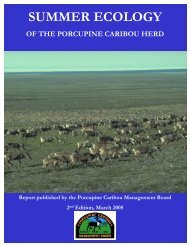Caribou Trails newsletter Spring 2007 - Taiga Net
Caribou Trails newsletter Spring 2007 - Taiga Net
Caribou Trails newsletter Spring 2007 - Taiga Net
You also want an ePaper? Increase the reach of your titles
YUMPU automatically turns print PDFs into web optimized ePapers that Google loves.
Wasting meat<br />
offends everyone<br />
and it’s against the law!<br />
•<br />
•<br />
Alaska Law requires that all moose and caribou meat must<br />
be salvaged for human consumption.<br />
In Unit 23 (prior to Oct 1) you are also required to leave the<br />
meat on the ribs, front quarters and hindquarters until it is<br />
brought out of the field. Meat may be de-boned once it has<br />
been transported to a state-maintained airport.<br />
•<br />
Antlers may not be removed from the kill site until all the<br />
meat has been packed out.<br />
• Meat must be transported out of the field in edible condition<br />
before or at the same time as the antlers.<br />
•<br />
Failure to salvage meat carries a minimum fine of $2,000<br />
and seven days in jail.<br />
Trophy antlers require trophy meat<br />
Don’t shoot it if you can’t pack it all out.<br />
Don’t Don’t shoot shoot early early into into a a long long hunt hunt or or float, float, or or in in warm warm weather. weather.<br />
Plan carefully with your guide or transporter...<br />
a delayed pick-up is not an excuse for letting meat spoil.<br />
Bad Bad weather weather is is not not an an excuse excuse for for bad bad meat—care meat—care for for it it properly. properly.<br />
Don’t give questionable meat away—nobody wants it.<br />
There are no freezers or meat storage facilities in Kotzebue.<br />
Keep your meat clean.<br />
Keep your meat dry.<br />
Keep your meat cool.<br />
Your ‘wilderness’ is somebody else’s backyard<br />
Alaska Natives have been hunting, fishing and living here for thousands of years. Today federal<br />
and state managed lands provide opportunities for anyone to hunt, camp, fish and recreate—<br />
but you are still expected to do so legally and respectfully.<br />
Leave a clean camp.<br />
Remove all garbage.<br />
Burn toilet paper.<br />
Keep your meat on the bone.<br />
Keep your meat in breathable cloth<br />
game bags - not plastic bags!<br />
Respecting 10,000 years of knowledge<br />
Alaska Native hunting traditions have evolved to allow<br />
for harvest of caribou without displacing their historic<br />
migration routes. Following these local practices is<br />
good for the caribou and good for hunter relations.<br />
Allow the first groups of caribou to pass undisturbed.<br />
There will be more following these leaders.<br />
If hunting along the Kobuk River, hunt only on the<br />
south side to allow the caribou to cross undisturbed.<br />
Do not place hunting camps so that they block the<br />
caribou trails or redirect the migration route.<br />
This message<br />
supported by:<br />
Alaska Dept.<br />
of Fish & Game<br />
907-442-1711<br />
A non-local<br />
hunter education program was<br />
launched in August 2006, with the<br />
above poster displayed throughout<br />
the region. It will be followed with<br />
an online Unit 23 non-local hunter<br />
education program.<br />
� e Board of Game has reduced the<br />
non-resident bag limit in Unit 23 to<br />
one caribou per year beginning in<br />
fall <strong>2007</strong>, and will require rib meat<br />
from moose and caribou to be left<br />
on the bone.<br />
� e <strong>Caribou</strong> Working Group also<br />
passed a resolution (right) calling for<br />
a cooperative planning process to<br />
fi nd ways to reduce hunter confl icts.<br />
Legal<br />
in and out<br />
of the field.<br />
Properly<br />
salvaged.<br />
Dismantle fire rings and all site modifications.<br />
Don’t trespass on private lands or subsistence camps.<br />
Don’t interfere with someone else’s hunting.<br />
Selawik National<br />
Wildlife Refuge<br />
907-442-3799<br />
Northwest Arctic<br />
Borough<br />
A raft is not a refrigerator!<br />
Most of the meat from these animals was salvaged<br />
and given to villagers—but it had begun to spoil.<br />
While no one was cited, the loss of meat angered<br />
everyone in the community. Similar instances in<br />
the future may be legally challenged.<br />
Legal<br />
out of the<br />
field only.<br />
Properly<br />
de-boned.<br />
Illegal<br />
in or out of<br />
the field.<br />
Inadequate<br />
salvage.<br />
Western Western Western Arctic Arctic Arctic <strong>Caribou</strong> <strong>Caribou</strong> <strong>Caribou</strong> Herd Herd Herd Working Working Working Group Group Group<br />
Western Arctic<br />
National Parklands<br />
Bureau of Land<br />
Management<br />
Goal: To To To work work work together together together to to to ensure ensure ensure the the the long-term long-term long-term conservation conservation conservation of of of the the the Western Western Western<br />
Arctic Arctic Arctic <strong>Caribou</strong> <strong>Caribou</strong> <strong>Caribou</strong> Herd Herd Herd and and and the the the ecosystem ecosystem ecosystem on on on which which which it it it depends, depends, depends, and and and to to to maintain maintain maintain<br />
traditional traditional traditional traditional traditional and and and and and other other other other other uses uses uses uses uses for for for for for the the the the the benefit benefi benefi benefit benefi of of all all people people now now and and in in the the future. future.<br />
Chair: Chair: Chair: Raymond Raymond Raymond Stoney Stoney Stoney Vice-Chair: Vice Vice-Chair: Roy Roy Ashenfelter Ashenfelter<br />
RESOLUTION RESOLUTION 2006-01 2006-01<br />
WHEREAS, WHEREAS, WHEREAS, WHEREAS, the the the the Western Western Western Western Arctic Arctic Arctic Arctic <strong>Caribou</strong> <strong>Caribou</strong> <strong>Caribou</strong> <strong>Caribou</strong> Herd Herd Herd Herd is is is is one one one one of of of of the the the the largest largest largest largest caribou caribou caribou caribou herds herds herds herds in in in in<br />
North North America America with with a a population population of of 490,000 490,000 animals animals as as of of July July 2003; 2003; and and<br />
WHEREAS, WHEREAS, the the Western Western Arctic Arctic <strong>Caribou</strong> <strong>Caribou</strong> Herd Herd is is a a critical critical subsistence subsistence resource resource in in<br />
northwestern northwestern Alaska Alaska providing providing an an estimated estimated annual annual subsistence subsistence harvest harvest<br />
of of 15,000–20,000 15,000–20,000 caribou caribou to to 40 40 communities communities within within the the range range of of the the herd herd<br />
WHEREAS, WHEREAS, the the Western Western Arctic Arctic <strong>Caribou</strong> <strong>Caribou</strong> Herd Herd is is important important to to recreational recreational hunters hunters and and<br />
other other users users who who live live outside outside the the range range of of this this herd herd and and their their use use of of the the<br />
herd herd herd herd provides provides provides provides an an an an important important important important source source source source of of of of income income income for for for guides, guides, guides, outfitters outfitters outfitters and and and<br />
WHEREAS, WHEREAS, the the Western Western Arctic Arctic <strong>Caribou</strong> <strong>Caribou</strong> Herd Herd Working Working Group Group adopted adopted a a Cooperative Cooperative<br />
Management Management Plan Plan in in March March 2003 2003 with with a a mission mission statement statement that that seeks seeks “ “<br />
… … to to maintain maintain the the traditional traditional and and other other uses uses for for the the benefit benefit of of all all people people<br />
WHEREAS, WHEREAS, the the Western Western Arctic Arctic <strong>Caribou</strong> <strong>Caribou</strong> Herd Herd Cooperative Cooperative Management Management Plan, Plan, March March<br />
2003 2003 identifies identifies and and endorses endorses “Guiding “Guiding Principles Principles For For Planning Planning and and<br />
Management, Management, No. No. 2 2 – – Recognize Recognize the the centuries-old centuries-old customs, customs, traditions, traditions,<br />
and and spiritual spiritual needs needs that that have have developed developed in in communities communities within within the the range range<br />
of of the the herd; herd; also also recognize recognize that that other other people people in in Alaska Alaska and and rest rest of of the the<br />
world world have have interests interests in in this this herd.” herd.” and and<br />
WHEREAS, WHEREAS, the the Western Western Arctic Arctic <strong>Caribou</strong> <strong>Caribou</strong> Herd Herd Working Working Group Group is is aware aware of of intensifying intensifying<br />
and and escalating escalating user user conflicts conflicts occurring occurring during during the the fall fall hunting hunting season season in in<br />
Unit Unit 23 23 between between local local subsistence subsistence users users and and non-local non-local hunters; hunters; and and<br />
WHEREAS, WHEREAS, the the Alaska Alaska Board Board of of Game Game met met in in November November 2005 2005 in in an an evening evening session session to to<br />
hear hear complaints complaints about about the the situation situation and and further further acted acted to to adopt adopt hunting hunting<br />
regulations regulations to to minimize minimize waste waste of of game game meat, meat, reduce reduce bag bag limits, limits, and and<br />
require require mandatory mandatory orientation orientation for for visiting visiting hunters hunters and and transporters transporters in in<br />
WHEREAS, WHEREAS, the the Alaska Alaska Big Big Game Game Commercial Commercial Services Services Board Board met met in in late late 2005 2005 and and<br />
2006 2006 to to identify identify existing existing problems problems and and further further acted acted to to assess assess conflicts conflicts in in<br />
WHEREAS, WHEREAS, the the Western Western Arctic Arctic <strong>Caribou</strong> <strong>Caribou</strong> Herd Herd Working Working Group Group held held a a forum forum during during<br />
their their Annual Annual Winter Winter Meeting Meeting in in February February 2006 2006 to to learn learn about about the the Unit Unit<br />
23 23 conflicts conflicts from from agency agency staff, staff, local local government government representatives, representatives, and and<br />
Hunting conflicts<br />
in the nana region<br />
are tackled by The<br />
<strong>Caribou</strong> Working<br />
Group, Northwest<br />
Arctic Borough,<br />
alaska state<br />
troopers,<br />
alaska Board of<br />
Game, ADFG, USFWS,<br />
NPS and BLM<br />
To report violations please call<br />
the Alaska State Troopers:<br />
Kotzebue 442-3222, Galena 656-1634<br />
or or toll toll free free 1-800-478-3377<br />
1-800-478-3377<br />
A frequent topic at <strong>Caribou</strong> Working<br />
Group meetings has been the<br />
increasing pressure from non-local<br />
hunters coming into the Kotzebue-<br />
Kobuk-Noatak area (Unit 23) each<br />
fall.<br />
� � e number of hunters and the<br />
small planes ferrying them in<br />
and out has frustrated many<br />
locals, and raised concerns about<br />
the disruption of traditional<br />
caribou migration routes. Other<br />
concerns include competition<br />
for choice hunting spots,<br />
increasing amounts of trash,<br />
and the amount of meat<br />
wasted by hunters primarily<br />
interested in antlers.<br />
Confl icts among sport<br />
hunters, subsistence users<br />
and commercial operators<br />
is a large and<br />
complex problem.<br />
Western Arctic <strong>Caribou</strong> Herd Working Group<br />
Goal: To work together to ensure the long-term conservation of the Western<br />
Arctic <strong>Caribou</strong> Herd and the ecosystem on which it depends, and to maintain<br />
traditional and other uses for the benefit of all people now and in the future.<br />
Chair: Raymond Stoney Vice-Chair: Roy Ashenfelter<br />
RESOLUTION 2006-01<br />
NOW THEREFORE BE IT RESOLVED, the Western Arctic <strong>Caribou</strong> Herd Working<br />
Group recommends and supports a broad cooperative planning process<br />
to resolve user conflicts related to caribou hunting in Unit 23; and<br />
BE IT FURTHER RESOLVED, the Western Arctic <strong>Caribou</strong> Herd Working Group<br />
requests all state and federal resource management agencies; regional,<br />
local, and tribal governments; guides and transporters; local subsistence<br />
hunters; non-local and non-resident hunters; and other recreational users<br />
of the herd participate in the cooperative planning process to find<br />
solutions to the user conflicts during the fall hunting season in Unit 23;<br />
and<br />
BE IT FURTHER RESOLVED, the Western Arctic <strong>Caribou</strong> Herd Working Group<br />
requests that the Bureau of Land Management refer to the Unit 23<br />
cooperative planning process (above) when developing and adopting a<br />
Recreation Management section of the Kobuk-Seward Peninsula<br />
Resource Management Plan that includes:<br />
1) expanding the Squirrel River conflict area to include other areas of<br />
conflicts in Unit 23,<br />
2) using interim measures to limit recreational users at current levels<br />
while a Recreation Area Management Plan (RAMP) is developed for<br />
areas of conflict,<br />
3) using the Unit 23 cooperative planning process to develop a RAMP<br />
that reduces conflicts in Unit 23; and<br />
4) allowing options for long-term cooperative planning processes to<br />
alleviate future conflicts that may arise in Unit 23.<br />
______________________________________<br />
Raymond Stoney, Chairman<br />
Western Arctic <strong>Caribou</strong> Herd Working Group<br />
September 14, 2006



